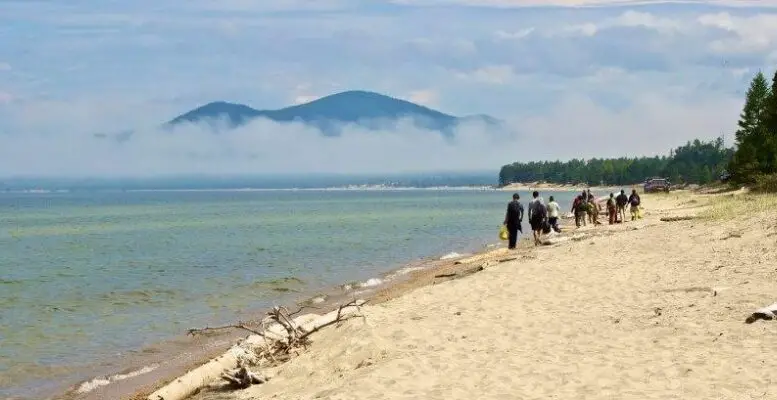Matt Robertson is the Programs Director at Tahoe Baikal Institute (TBI), an NGO that connects two of the world’s unique lake ecosystems and, in doing so, promotes Russian-American cultural awareness as well as international cooperation, sustainable development, environmental policy, and peace. He previously studied abroad with SRAS’s Russian as a Second Language program in Moscow and later with TBI’s SEE Program (a partner program with SRAS’s Baikal Environmental Studies). In part based on his performance studying with TBI, he was offered the opportunity to lead the organization’s programs.
Interview by Lisa Horner, Program Consultant, Institutional Relations, SRAS
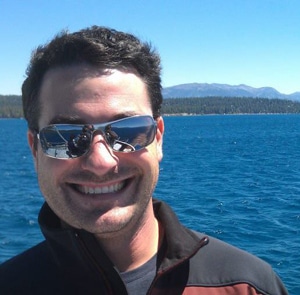
Matt Robertson, Program Director for Tahoe Baikal Institute, in front of Lake Tahoe in America.
SRAS: In summer 2008 you did SRAS’s Russian as a Second Language program in Moscow. What has been your path since (i.e. what led you to the TBI position)?
Matt Robertson: I have been a part-time graduate student at CSU Chico focusing on Russian History and Russian-American Relations. I will graduate with my MA this spring, so that has definitely kept me busy. I’ve served as a Graduate/Teacher Assistant at CSU Chico on several occasions as well. After I returned from the SRAS program I was hired as a project manager for the Chico Economic Planning Corporation, a local non-profit economic development organization. This gave me some vital work experience in the non-profit and business sectors. When you work for a non-profit, because of the limited resources at your disposal, you have to learn how to do a little bit of everything. I’ve planned fundraising events, sold sponsorships, worked trade shows, hosted forums, built websites, designed PowerPoint presentations… all these things made me a ready-prepared candidate for the TBI position I currently occupy. After having made Chico my home for 11 years I have moved to south Lake Tahoe, and with the lake not 1 minute from my front door, I can’t complain too much about the relocation.
SRAS: What was involved in applying for and landing your position as Programs Director with TBI?
MR: I was lucky enough to be a participant in TBI’s 2012 SEE program, and when the outgoing Programs Director offered up my name to our Board of Directors, I interviewed for the position within days of being contacted. The board felt comfortable with my nomination and I started on January 2nd. I’m definitely an example of how international exchange opens up job avenues. Behave yourselves on your exchange program kids, you might get a job out of it!
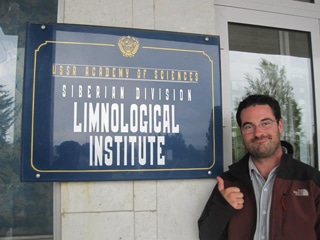
Matt Robertson outside the Limnological Institute in Irkutsk. The sign still proclaims the Institute to be a division of the Academy of Sciences of the USSR.
SRAS: Can you explain in just a few sentences what Tahoe Baikal Institute (TBI) does and what your role is as Programs Director?
MR: The Tahoe-Baikal Institute is an International non-governmental (NGO) organization dedicated to improving cultural awareness between Russia and America as well as forwarding international cooperation, sustainable development, environmental policy, and peace. It’s an ambitious mission statement but it is one that has proven its appeal and purpose time and time again as TBI will be launching its 22nd Summer Environmental Exchange (SEE) program this summer. While this is our flagship program, it is not the only one we run. As the Programs Director I am directly responsible for the planning and execution of our programs both domestic and internationally, supervising a small but dedicated staff scattered across three countries! Through environmental research, meetings with policy makers and regulatory agencies, recreation and co-habitation with the international participants, the SEE program places participants in a two month whirlwind of personal and professional growth, all while learning about how Russians, Americans, and Mongolians interact with their environment, balancing lifestyle and economics with protecting vital natural resources and eco-tourist opportunities.
SRAS: Have you since needed to use the Russian you learned that summer with SRAS? Have you been abroad since and are you planning to go in the near future in relation to your new position with TBI?
MR: I have been abroad several times since my 2008 SRAS program. I credit that program for preparing me for the travels I have been lucky enough to be on since then. I have used my Russian in every country I’ve been to, for better or worse, as the Polish people did not appreciate my Russian skills… Here’s a lesson in how history impacts daily life: the troubled and complicated history of Russian-Polish relations is well known. I don’t speak Polish, and while I was traveling there I was repeatedly scolded for “pronouncing things like a Russian” because I habitually rolled my “r’s” as one would do in Russian. Poland is wonderful, my experience there was top-notch. But please, when in Poland, speak English, and absolutely do not roll your r’s! I also made friends with a Russian girl while I was studying in Germany who was thrilled with my passion for Russian history. We spent many days together swapping professional English lessons for 3rd grade level Russian lessons. She has since become one of my best friends!
I will be accompanying the participants of our SEE program to Baikal this summer, which marks my second time to Siberia and third time to Russia. While Moscow remains my favorite city in the world, Lake Baikal is a breathtaking sight. There is really nothing quite like it. It is, after all, the oldest, deepest, biggest lake in the world. And you wouldn’t believe how nice the beaches are!
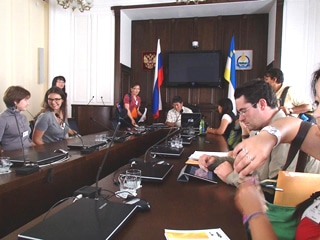
Just like Lake Tahoe is administered by California and Nevada, Baikal is administered by several state governments within the Russian Federation. While almost all policy is dictated from Moscow, these agencies are responsible for monitoring the Lake, enacting federal regulations, and implementing the development strategies for Baikal’s economic and environmental future. The Buryats are one of several non-Russian indigenous peoples of the Baikal region, and their native tongue is mutually intelligible with Mongolian. Here, representatives from the Republic of Buryatia in Ulan Ude meet with SEE students.
SRAS: As a Russian history major, how did you come to head up an NGO focused on the environment? What does your background bring to such an organization?
MR: While my professional background prepared me for much of the day-to-day operations and realities of working for an NGO, the most immediate qualification for me becoming the Programs Director was my status as a TBI alumnus. My passion for Russian history and culture is what made me want to be a part of the SEE program. Lake Baikal is a world-famous, UNESCO world nature heritage site, and the opportunity to travel there is one that should not be passed up. The adventure of it all was overwhelming. While I am not an environmental scientist or activist by any definition, I was brought up with a profound sense of place and respect for the wonders of nature. I grew up in the redwoods in northern California, a major environmental battleground between just about every faction you can imagine.
The delicate act of balancing economic growth via resource exploitation with environmental protection and preservation is fused to my DNA. Humanity uses the environment to fashion civilization and society, but we have a responsibility in this day in age to do so with an eye to the undeniable consequences of our actions. Russia is wrestling with these questions now in profoundly new ways, and TBI has been at the vanguard of the Russian environmental movement for years.
The transition to a market-based economy has impacted Russia in different ways in different regions. Moscow and St. Petersburg for example, have potentially never looked better. However, Siberia, as is always the case, is experiencing capitalism with different results. The Soviet Union pumped a ton of money into settling, maintaining, and expanding the Siberian industrial sector. Whole towns centered around massive plants and factories dot the Siberian landscape. These facilities were never required to turn a profit and the infrastructure that supported them was funded by the massive Soviet state. Little to no concern was paid to the environmental damage these facilities caused, and one particularly controversial example is the Biakalsky pulp and paper mill, which is situated on the shore of Lake Baikal and uses water from the lake in its production process.
With the collapse of communism and the sudden impetus for these formerly state-run facilities to become economically self-sufficient, cities and towns all across Siberia have fallen into disrepair or been abandoned. Communities are looking for ways to sustain their livelihoods in difficult circumstances. Around Lake Baikal, this creates a fairly unique debate. The lake has been the crown jewel of the environmental movement in Russia. This movement, since the elimination of the totalitarian state, has been able to grow relatively unimpeded. Industrialists are eager to build pipelines and mine the vast mineral wealth of the region. The people who live around the lake want to keep them at bay in order to preserve the lake’s spectacular beauty and biodiversity. But if money is not to be made from industrial development, it has to come from the only other resource there: the lake itself.
By preserving the lake in all its current glory, establishing strict rules and guidelines for development and usage, Russia hopes to create sustainable jobs and growth based around eco-tourism. If the lake is spoiled or damaged, tourists will stop coming and all chance of region-wide growth snuffed out. At Baikal, environmental education and protection integrate with economic development creating a grand sustainability experiment. TBI has been operating in the region for over twenty years, and our alumni are scattered across the Baikal area, many of whom have started their own NGOs, a very courageous thing in Russia’s complex political climate.
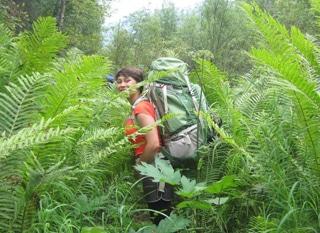
Kieran Ficken, from the university of Vermont, evaluates a trail for tourist use as part the SEE program. The trail is in a strictly protected area along Baikal’s southern shore as part of a planned enhancement of eco-tourist capabilities. SEE students mapped the trail, or occasionally relocated it, identified landscapes of interest to tourists and cataloged biodiversity while hiking through pine forests, sand bars, bogs, marshes, and these glorious fern groves.
SRAS: What do you find are the most fascinating aspects of your involvement with TBI?
MR: One thing I have found particularly fascinating is the degree to which Russians in the Baikal area are dedicated to protecting their lake. Russia is not known as a particularly environmentally-conscious nation, and Russians traditionally have a very ambivalent relationship with nature. However, in Baikal this is simply not the case. It is a given that the lake must be protected at all costs and efforts to industrialize the region around the lake have been fought tooth and nail. As a result, there is an impressive system of national parks, nature preserves, and wildlife reserves in the Baikal area. Some of these are very strictly protected, and TBI is one of the only organizations allowed into some of these areas.
This stands as a stark contrast with Lake Tahoe, which was overdeveloped and over-logged with no regard at all for the environment and is now struggling to regain its natural ecosystem. Tahoe is an environmental reclamation project, an experiment to see just how high an anthropogenic load a watershed can carry and still maintain its quality, or better yet, see its ecosystem recover while sustaining human economic activity. Baikal faces the opposite challenge. The lake is functioning almost perfectly as an ecosystem, and while it is threatened with challenges on all sides, the development occurring in the region is being designed specifically to not impact the Lake. Time will tell how successfully Russia carries out this inspired piece of developmental planning. TBI and our alumni will be watching.
Also, the history of the Russian expansion into Siberia is fantastic. I love reading about Russia’s companion piece to our own march westward.
SRAS: SRAS and TBI partner on Baikal Environmental Studies (BES), a summer program in Russia, in which students spend a month in Irkutsk studying the Russian language and the specific challenges facing Siberia as it transitions from a planned to a market economy, and then join TBI to research, explore, and improve the environment of the Lake Baikal region for the last month of the program. What types of students can you see this program appealing to? What are some of the program highlights in your view?
MR: Not everyone gets to camp out on the shores of Lake Baikal or partner with local organizations to research the impact of proposed tourist ventures in the Baikal region. Our work on both sides of the Pacific is real-world applicable, and the issues are discussed openly and honestly. Lake Baikal is the primary natural and economic resource in its region – without the surrounding forests, tourism, scientific work, fishing, etc. there is simply no point for many of the towns in that area to exist. Therefore, it is vital that the unique ecosystem there be protected – the ecosystem and the sights surrounding the lake are the resources that the community is hanging their proverbial “economic hats” on. Residents around the lake need jobs, but overdevelopment, or simply the wrong kind of development, threatens the very resource that is the lifeblood of the area.
Given the wide range of topics debates like this inevitably bring up, students from all academic disciplines should seriously consider this program; it offers something for everyone: students of policy and development, environmental activism and research, history and even business will find this program invaluable. Siberia is a fascinating place to visit, and there is no program I am aware of as diverse and yet intimately tied to the “Sacred Sea of Siberia” as ours. You see first-hand in the cities of Siberia the degradation and neglect suffered when the Soviet Union collapsed, striping this remote area of the government funds used to support infrastructure, human services, education, and the economy. You also see the emergence of a generation of Russians who want to develop their beloved Lake Baikal in an effort to share it with the world, and not simply to develop it pell-mell and strip it of all its glory for the sake of capitalism. If you bother to pay attention, you see things about Russia and its people that you could never imagine in Moscow or St. Petersburg. I believe there is a saying that in Russia, the colder the weather, the warmer the people.
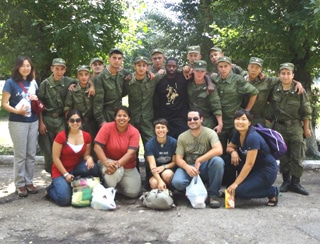
Matt Robertson and the SEE group posing with Russian soldiers they befriended in Naushki, a town that lies on the Russian-Mongolian border.
SRAS: If a student is thinking about applying for BES or SEE, what advice would you have for them?
MR: Be adventurous! Be bold! Programs like this are ambitious and not for the faint of heart. With SEE, you’ll see Siberia, Mongolia, and rural California and Nevada: these are intense locations but they are fabulously beautiful. BES offers a shorter and more focused look at Siberia, but it is no less intense. The friends you make on these programs become friends for life – you live and work together, you learn all sorts of things about what it means to be a leader, and how to cope with group dynamics that develop quickly. You have to be willing to grow, learn, push yourself, and roll with the punches. And brush up on your Russian! While you don’t NEED to speak the language to participate, it sure helps to know a little bit. Siberia is NOT European Russia. It’s as far removed as Cody, Wyoming is from New York City in every way imaginable. Consider the next time you could spend an entire summer living on Lake Tahoe AND Lake Baikal. For SRAS students interested in BES, I invite you to join our group for a unique adventure and a fascinating look at what makes Siberia tick, or what holds it back. Your knowledge of the world around you will increase exponentially. Have I mentioned the glories of smoked omul? Or just how far down you can see a rock you tossed into Baikal before it vanishes to the eye? Well you’ll just have to find out for yourself what I’m talking about. Drop me a line: [email protected].


